As my feet ache slightly from walking around the elegant Geneva between meetings and events at the 76th World Health Assembly, I am reminded that I need to pack more practical shoes. It is my first WHA and for the first time in a while I feel some hope
The world is in a poly crises and every global event is complicated political, economic, and environmental comorbidities, from natural disasters to underdevelopment, from conflict to corruption. It is easy to become despondent and wonder if there is any sliver of hope as we run from pillar to post, putting out fires of different kinds.
In meetings at the World Health Assembly, I am energised by the spirit of fellow experts, advocates and activists who demonstrate by their commitment to improving health security for all, but especially the young people I am meeting whose clear vision and boundless energy fills me from hope. I am meeting young people from small island states taking their voices from Tonga and Samoa and Fiji to Geneva, demanding better from the world and keeping those entrusted with making policies alert to the realities of our time, the realities of global health, the realities of our climate crises. I am seeing young people take charge of their own future, determined to achieve change.
Even as my aching feet remind me of the years behind me, I see these young people and think, if there is one thing that fills me with hope for the future, it is the commitment of the coming generations to shifting the Overton window and changing how the world works, breaking glass ceilings and stereotypes and refusing to accept inequity as the status quo.
I find myself also reflecting on the journey we have undertaken so far this year. In the realm of global health, 2023 holds tremendous significance. It marks the moment when the World Health Organization (WHO), whose decision-making body is the WHA, declared the end of COVID-19 as a public health emergency of international concern. Simultaneously, we witness the beginning of research endeavors into associated challenges such as Long Covid.
This gathering serves as only the second in-person Health Assembly since the inception of the COVID-19 pandemic, providing an opportune time for introspection and evaluation for member states that comprise the WHA.
It has been rewarding meeting Ministers of Health from all around the world engaging in robust dialogue and negotiations as representatives of as many as 190 nations and governments work out a Pandemic Treaty that works, one that assures that the mistakes and blind spots of the last pandemic do not repeat themselves. With what our activity and greed is doing to the planet, it is not a matter of if but when the next pandemic will come, and the task at hand is to ensure that unlike 2020, much, if not all of the world is in a state of preparedness, proactively working to ensure that health systems around the world function and are able to handle global health events and that solidarity, cooperation and transfer of expertise and technology become the norm, to give us a fighting chance.
I find certain comfort in the approach of the WHO at this assembly and what I perceive to be a commitment to action beyond rhetoric and mere political declarations.
In the guiding document of the WHO, it states that “the constitution of THE STATES Parties to this Constitution declare, in conformity with the Charter of the United Nations” that certain principles are basic to the happiness, harmonious relations and security of all peoples. Chief among those principles is that “the enjoyment of the highest attainable standard of health is one of the fundamental rights of every human being without distinction of race, religion, political belief, economic or social condition.” To do this, the WHO must position itself to be equitable and inclusive in all of its processes and outcomes.
I do not always feel included by every global health process and in fact, much of my work is about calling out global inequities, not just in health but across all of society, from education to development, from climate to gender. In a world with much to despair about, these meetings are giving me a sense of egalitarianism and inclusivity. Though it may only be symbolic, seeing everyone walk through the same doors as opposed to common fixtures in high level meetings where hierarchy becomes immediately apparent, brings me a sense of calm, perhaps not yet about the world, but at least about this meeting of leaders and experts in global health. The role of the WHO is central to all of this and I would remiss not to acknowledge this now that the WHO marks 75 years of working towards “ the attainment by all peoples of the highest possible level of health.”
For countless individuals, including myself, the WHO has been a guiding light, offering vital interventions that have saved innumerable lives, particularly in low-income countries. From childhood vaccinations to malaria treatments, the WHO has played an indispensable role in enhancing the health and well-being of people worldwide. Growing up in a low-income country, I personally experienced the benefits of the early interventions championed by the WHO, such as my childhood vaccinations in Ibadan and access to malaria treatments.
The very existence of the WHO has served as an inspiration for many, myself included, to pursue careers in medicine and public health. I vividly remember the late Professor Adeoye Lambo, affectionately referred to as "uncle" in our household, who served as the Deputy Director-General of the WHO from 1973 to 1981. He held an almost mythical status during his tenure, captivating my father with tales of the incredible work carried out by the WHO. It was his influence that shaped my father's aspiration for me to become a medical doctor. Education held paramount importance within my family, and my contribution to humanity was seen as lying within the realm of medicine.
Multilateralism stands as an essential element of global cooperation, especially when confronted with intricate global health challenges. The World Health Organization (WHO) serves as a critical player in global health multilateralism, operating as a specialized agency of the United Nations with a unique mandate to promote health, safeguard the world, and serve the vulnerable. Serving as a platform for countries to come together and exchange knowledge, expertise, and resources in addressing health challenges, the WHO has played an instrumental role in advancing the health and well-being of people worldwide.
The WHO recognizes the significance of regional and local perspectives, as well as expertise, in tackling health challenges effectively. By fostering and coordinating a multilateral approach, the WHO ensures that health interventions are more impactful and take into account local contexts. Through collaboration with various stakeholders, the WHO strives to achieve common health objectives rather than competing with other health initiatives.
While the WHO, like any organization, is not without its imperfections, it serves as a normative institution guiding global health policies and practices. Its importance cannot be overstated, as it plays a vital role for the vast majority of the world's population, who rely on its guidance and support for their very survival. Today, I take immense pride in my association with the WHO, serving as a special envoy to the Director-General. It is an extraordinary privilege to work alongside the heroes of our time who are devoted to delivering health equity and justice to those in greatest need.
Amidst the multitude of crises the world currently faces, ranging from climate change to conflicts, gender inequality, and corruption, we require a strong WHO that can rise to the challenge and provide healthcare to all, regardless of their economic status or background. The establishment of the WHO was driven by a vision to serve the underserved across the globe. Today, this vision remains as significant as ever. With an African leader at the helm as the current Director-General, we are reminded of the unique challenges that accompany this position. Nevertheless, the need for the WHO is more pronounced than ever before, as it guides us through these uncertain times and ensures equitable access to quality healthcare when it matters most.
As the WHO celebrates its 75th anniversary, we have the opportunity to reflect upon the tremendous impact this organization has had on the health of the world's population. Its contributions to global health multilateralism and commitment to addressing complex global health challenges have been pivotal in advancing health equity and promoting health for all. As we forge ahead, it is imperative that we continue to support and strengthen the WHO in its mission to promote health, safeguard the world, and serve the vulnerable.
I am honored to be a part of these discussions taking place at the World Health Assembly in Geneva. Just like the conversations held earlier in the month in New York in preparation for the 2023 High level meetings, on tuberculosis, universal health coverage and pandemic preparedness prevention and response, I am thrilled to be engaging with colleagues and organisations working hard to promote health security for all.
In the Strategic Roundtables and side events I have taken part in, we have discussed current priorities and next solutions on vital issues for global public health. Panels on climate have brought to the fore how interconnected our world is and how climate change is one of the biggest threats to achieving health security for all and sits at the intersection between many crises, often worsening already difficult situations.
One particular highlight for me especially as Board Chair of the diagnostics body FIND, was the Diagnostics day.
At the Foreign Policy Event on Diagnostics we discussed the Diagnostics Resolution a crucial set of proposals to ensure that people are equipped with the information to better position them to take charge of their own health. Much of the complications with health especially in Africa begin with the absence of proper diagnostics to enable people identify and properly treat diseases. It also helps individuals prevent disease by helping them making the necessary decisions which help them lead a better quality of life. You cannot treat a disease you cannot see and there is no substitute for proper diagnostics.
At the core of much of the problems and fractures in global health is a breakdown of trust at all levels of society, between citizens and their governments, between nations with different levels of influence and power, between the various institutions working in global health, between citizens and health institutions locally and internationally between citizens and health workers as well as between health workers and the governments charged with making sure health systems work. At a crucial panel organised by Devex on rebuilding trust in the global health system I was happy to share ideas about what trust means, why we must recognise that there is a trust deficit and how to close that gap. Without trust nothing works, negotiations break down, and governments are unable to get citizen cooperation as they create and implement public health policies.
In particular, the events of the past few years have revealed fractures and divisions within the global health landscape. Even as hopeful as I am, I am aware of the magnitude of the work required to heal these wounds and unite different factions. Trust stands as a fundamental prerequisite for strengthening global health security and fostering a renewed sense of optimism in our collective ability to achieve equitable health for all. In my capacity as WHO Special envoy on ACT-A, rebuilding trust is even more crucial especially after seeing Africa being left behind during the COVID-19 pandemic. We can build on these positive, encouraging discussions and inclusive negotiations at the WHA by carrying on with this spirit after the WHA. Let the words that we uttered, the commitments we made, the bridges we built and mended, the resolutions we took and declarations be made move from the printed pages and computer screens to concrete action on the ground. I am particularly pleased that in building a future of preparedness and trust, I can confirm that ACT-A will continue until the INB process has concluded and any agreed new platform is implemented. This assures us of continuity, consistency and coherence aided by the institutional memory we have acquired from working for a future where we are better prepared and more united to take on a future pandemic or disease outbreak.
While I choose to be optimistic I still urge vigilance for we cannot afford to be complacent nor do we have time to dither about building the relationships and systems to protect our health and that of the most vulnerable among us. I hope to see the connection made between well worded proposals and practical solutions on the ground driven by people with expertise who have and continue to work on health at country and community levels.
The future of the WHO holds a profound significance, surpassing the immeasurable achievements of its past. As we gather for the 76th World Health Assembly, the theme 'WHO at 75: saving lives, driving health for all' resonates with unparalleled urgency. In a world plagued by crises, the imperative for equity has never been more crucial. It is imperative that our practical actions transcend rhetoric, reaching ALL individuals regardless of their place of birth, gender, economic status, circumstances of birth, race, or sexuality. Member states must strategically prioritize inclusivity, amplifying the voices of those typically left behind. The leaders of nations must assume their responsibility in ensuring that their citizens are not marginalized. As we reflect upon the journey thus far, let us fortify the WHO, a beacon of hope and justice, to heal the fractures in the global health landscape.
And as I look to a future where health equity reigns supreme, one thing is certain, the next time I have to do this much standing and walking around Geneva, I will be getting more practical shoes.



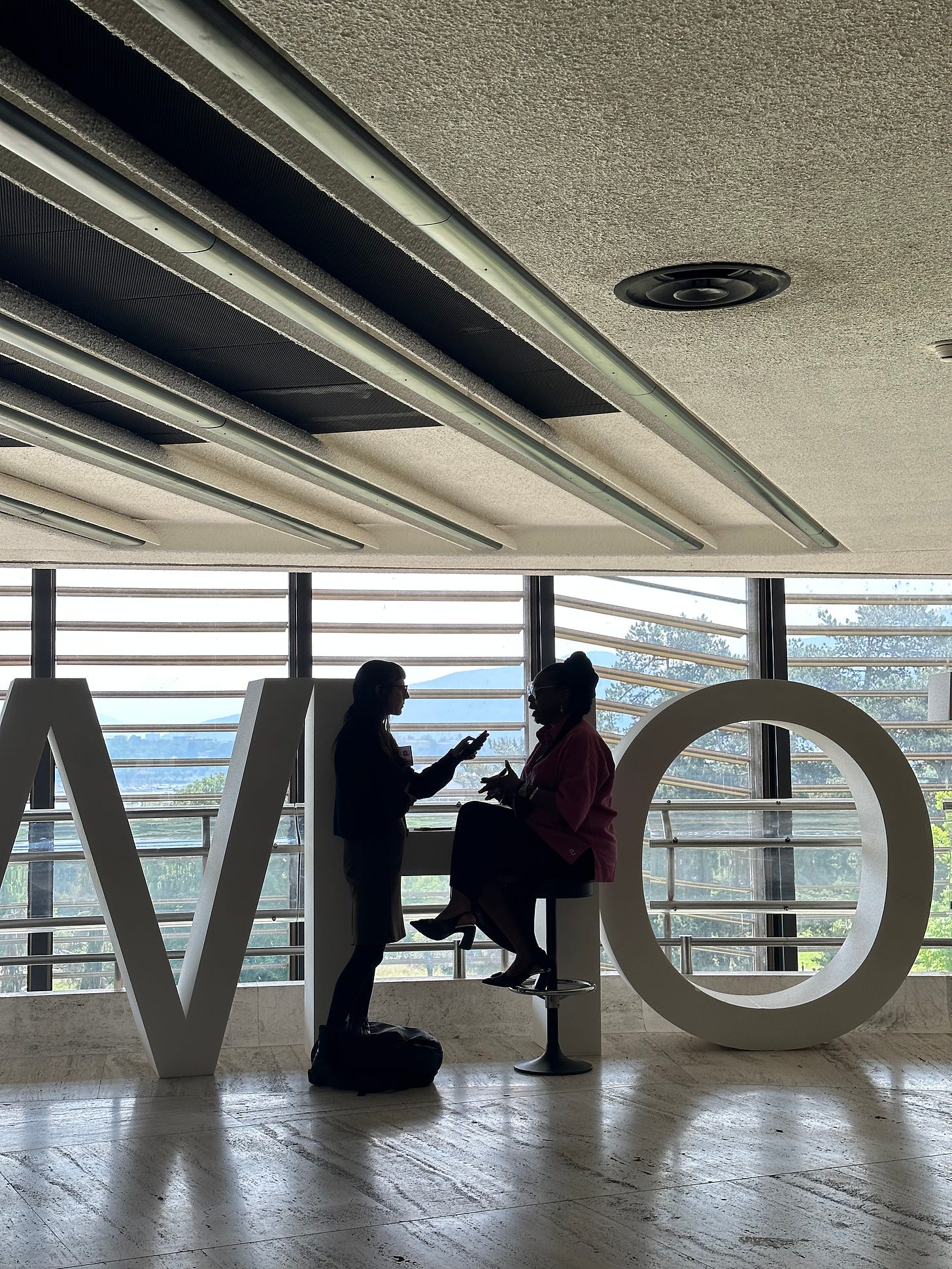
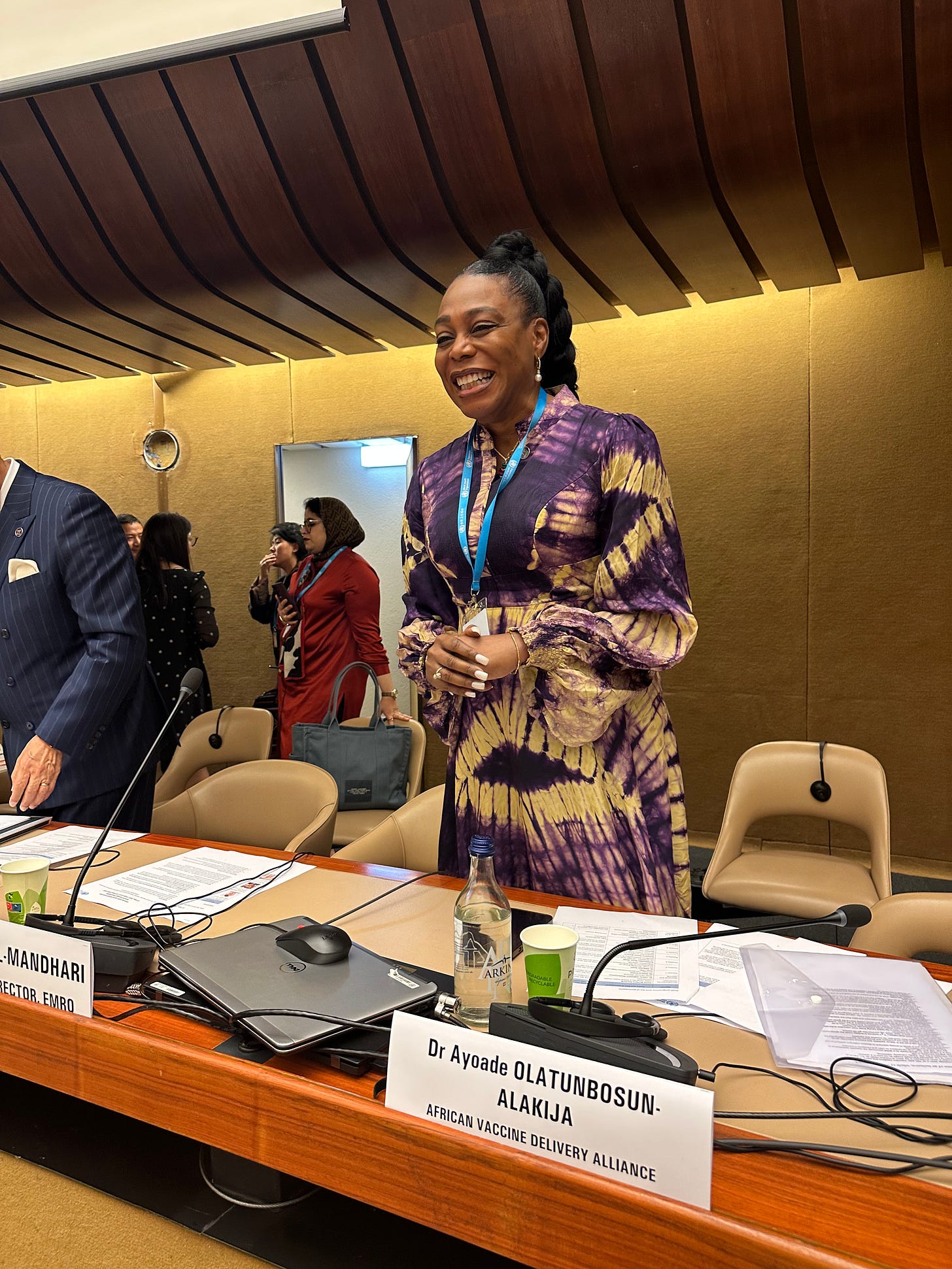

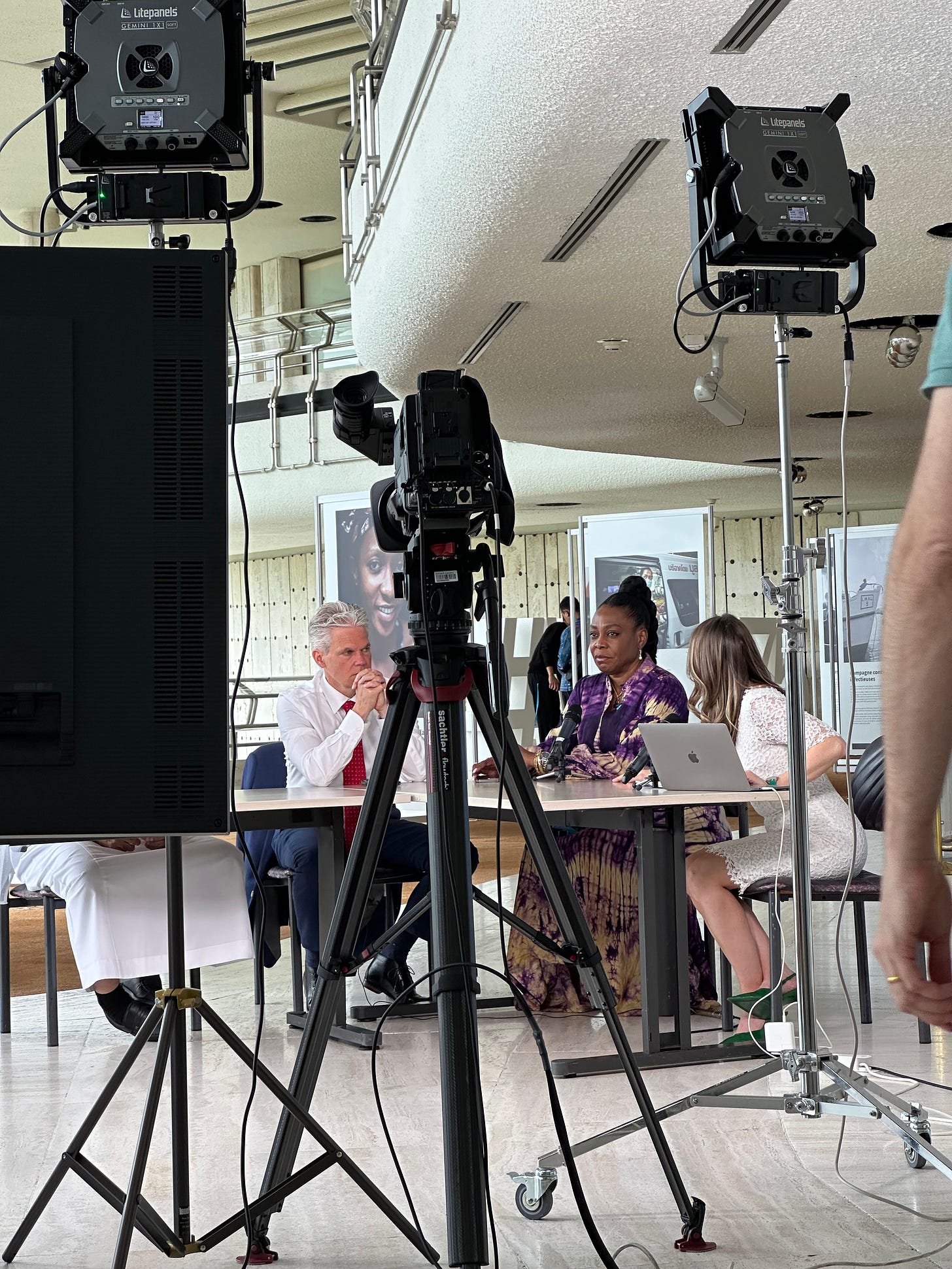
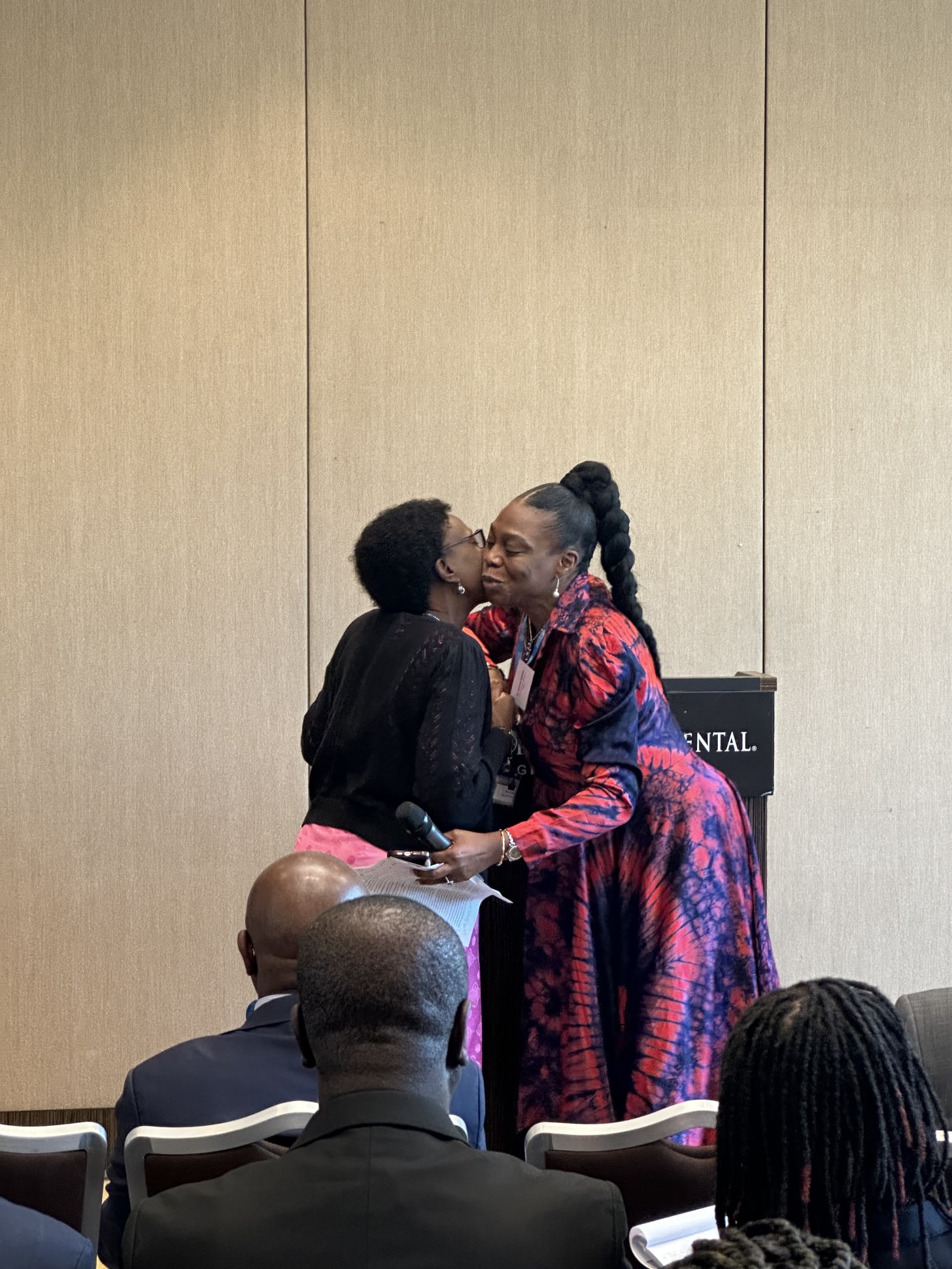
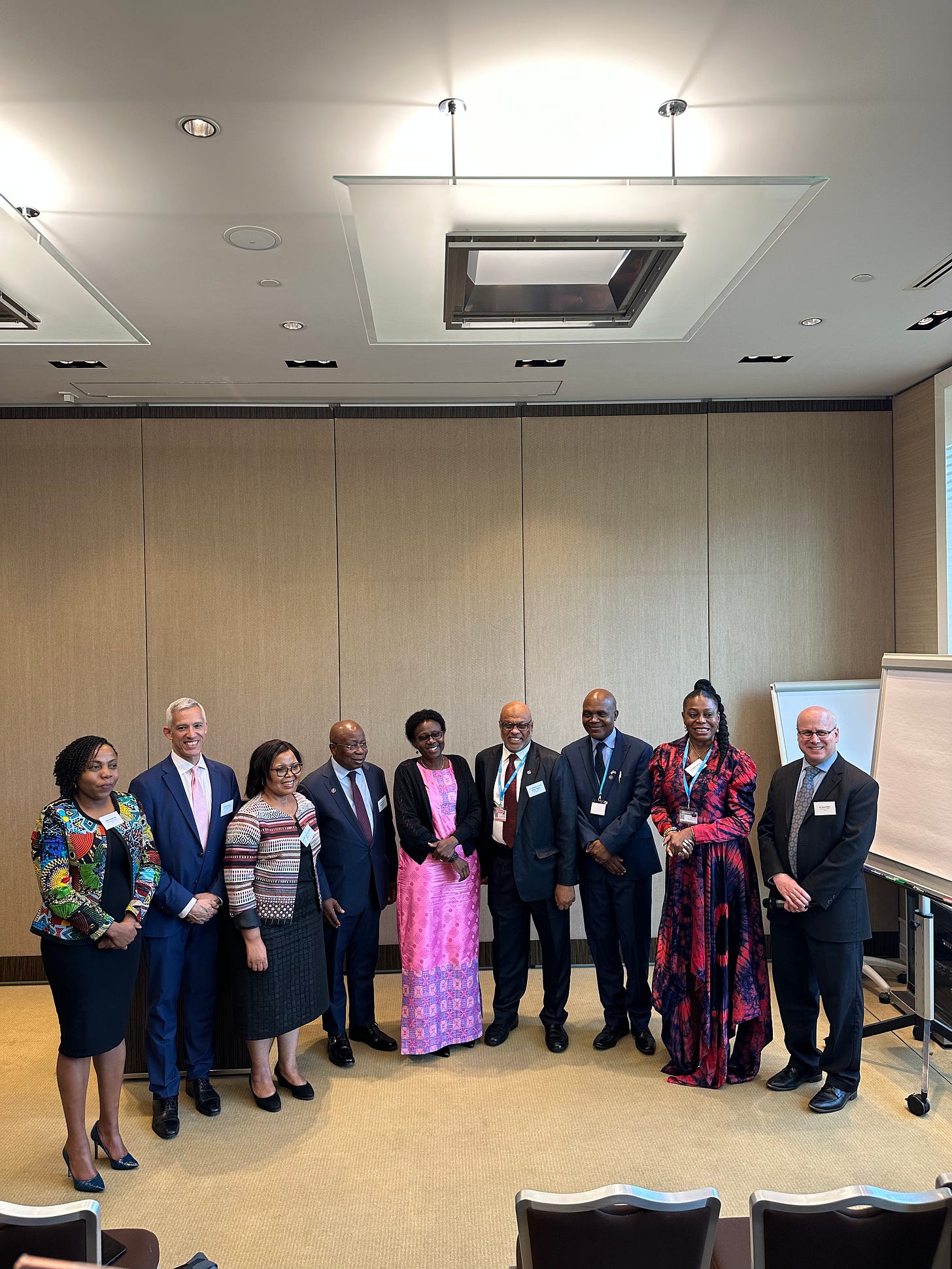
This is a very detailed read. I wasn't able to attend but your tweet was a much needed lifeline drawing us to go along with you and experiencing WHA